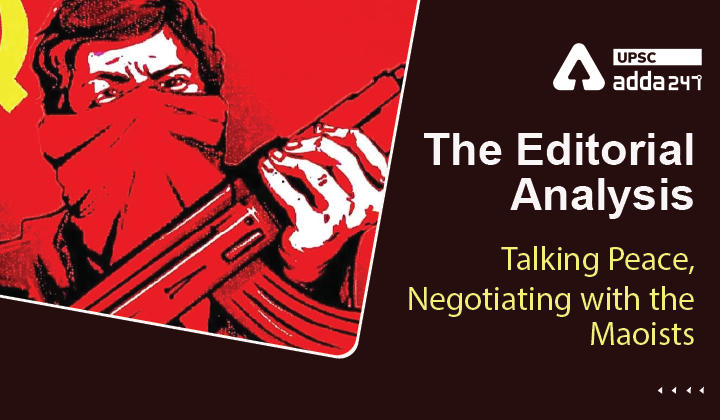Table of Contents
Naxalism in India UPSC: Relevance
- GS 3: Role of external state and non-state actors in creating challenges to internal security.
Naxalism in India: Context
- Recently, the Chief Minister of Chhattisgarh announced that the State government was ready for peace talks with the Maoists provided they laid down arms and expressed their faith in the Constitution of India.
- Click here to know about naxalism in India.
Peace talks with maoists: Key points
- In a response to the proposed offer, CPI(Maoist) asked the government to clear its stand on the Maoist’s conditions for creating a conducive atmosphere in which to hold peace talks.
- The party also criticised the government for not implementing the Provisions of Panchayats (Extension to the Scheduled Areas) Act, 1996 in Chhattisgarh.
Demand of Maoists
- A lifting of the ban on their party, the People’s Liberation Guerilla Army (PLGA) and people’s organisations;
- Withdrawal of security forces from camps, and
- The release of jailed leaders in order to participate in the talks
- As the state government have not changed their earlier stance, there has been no progress in conducting peace talks.
Earlier peace talk attempt with Maoists
- In 2010, the then union home minister tried to bring the Maoists to the negotiating table, the Maoists, however, demanded the following for a dialogue with the Union government.
- Mutual ceasefire and not unilateral ceasefire by the Maoists.
- For peaceful legal work by the Maoists, lifting of the ban on the party was necessary.
- The third condition was that the government should adhere to the Constitution and end the illegal murders in the name of encounters, tortures and arrests.
- Before the talk could take place, Azad, a Maoist party representative, was killed in an encounter with the Greyhound commando force of the Andhra Pradesh police on July 2, 2010 and the process of trust building derailed.
Why talks failed?
- Actions by Maoists: Though the Maoists at the peace talks had handed over their weapons to their cadres while leaving the jungles, media pictures of activity by their armed squads made the police uneasy. The Andhra Pradesh Home Minister levelled allegations against the Naxalites about extortion for their meetings and construction of their memorials.
- Government actions: The State government cannot afford the risk of moving out security forces as a pre-condition for initiating peace talks.
Naxalism in India: Recommendations
- The release of jailed Maoist leaders need not be made a pre-condition by the Maoists, as most senior Maoist leaders are at large; there is no senior cadre in Chhattisgarh’s jails.
- Moreover, the Chhattisgarh government has not only withdrawn criminal cases against many tribals but has also ensured expeditious trial of Naxal cases. The government is also hard at work to implement PESA.
- With regard to the third condition, of lifting a ban on the CPI(Maoist), the PLGA and its front organisations, some concessions may be thought of to let the talks happen. Further, it cannot be denied that the Maoists misused the ceasefire during the 2004 peace talks in Andhra Pradesh.
- Therefore, moving forward with the lessons learned, suitable modalities may be worked out if both sides are serious about peace talks.
- Click here to know about government steps to contain naxalism in India.
Read current affairs for UPSC





 TSPSC Group 1 Question Paper 2024, Downl...
TSPSC Group 1 Question Paper 2024, Downl...
 TSPSC Group 1 Answer key 2024 Out, Downl...
TSPSC Group 1 Answer key 2024 Out, Downl...
 UPSC Prelims 2024 Question Paper, Downlo...
UPSC Prelims 2024 Question Paper, Downlo...




